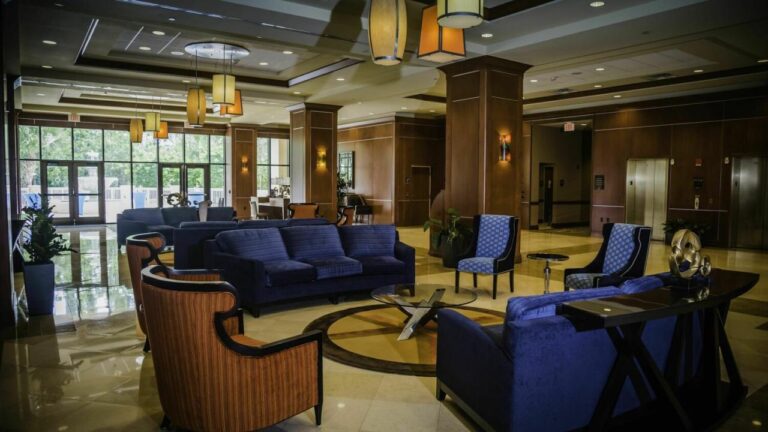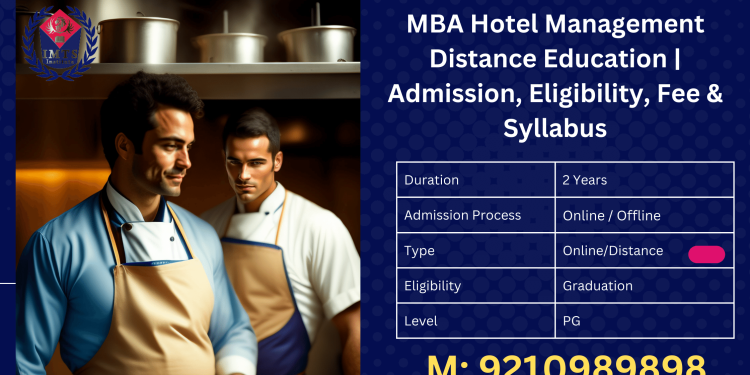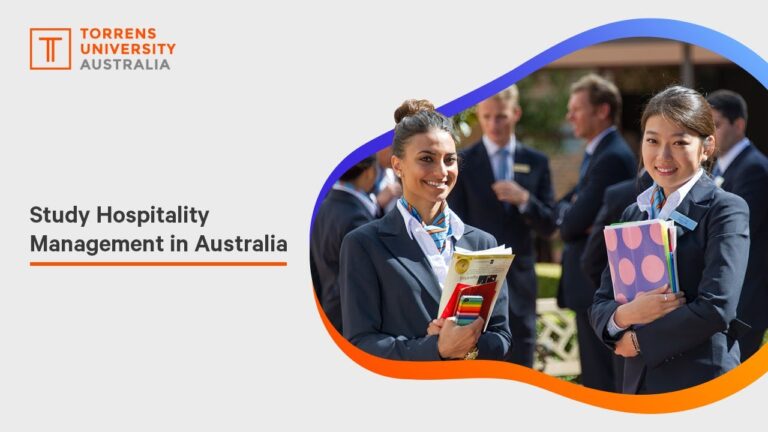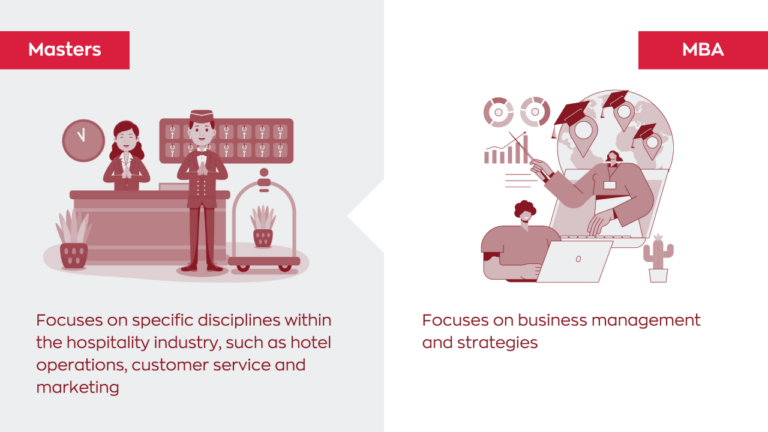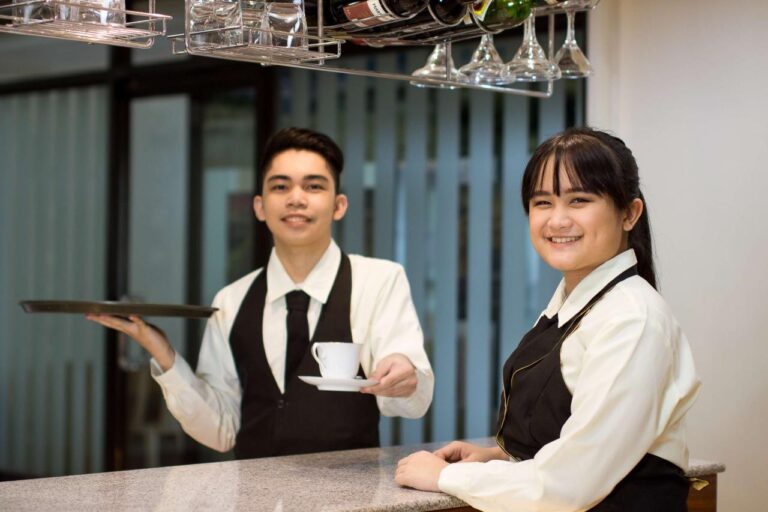Online MBA for Hospitality Executives
Online MBA for hospitality executives offers a transformative pathway for seasoned professionals seeking to elevate their careers. This program caters to the unique demands of the hospitality industry, blending rigorous academic training with practical applications relevant to today’s dynamic market. It equips participants with advanced management skills, strategic thinking capabilities, and a deep understanding of the latest industry trends, ultimately fostering leadership potential and driving professional advancement.
The curriculum typically encompasses core MBA subjects like finance, accounting, and marketing, but integrates specialized hospitality modules focusing on areas such as revenue management, operations, and service excellence. Admission requirements often include a bachelor’s degree, professional experience, and GMAT or GRE scores. Online learning methodologies leverage technology to deliver flexible and accessible education, incorporating interactive sessions, case studies, and collaborative projects that mirror the collaborative nature of the hospitality sector.
Graduates frequently transition into senior leadership roles, leveraging their enhanced skillset to achieve significant career growth.
Program Overview
An Online MBA for Hospitality Executives provides a rigorous and flexible education tailored to the specific needs and demands of professionals in the hospitality industry. This program equips participants with advanced business acumen, strategic thinking skills, and the technological proficiency necessary to thrive in today’s dynamic and competitive landscape. The curriculum blends core MBA principles with specialized hospitality-focused modules, fostering a comprehensive understanding of the industry’s unique challenges and opportunities.The curriculum typically includes a blend of core MBA subjects and hospitality-specific electives.
Core courses cover areas such as financial management, marketing, operations management, and strategic management. Hospitality-focused electives might delve into areas like revenue management, hotel operations, food and beverage management, tourism marketing, and sustainable hospitality practices. The program often culminates in a capstone project or thesis, allowing students to apply their knowledge to a real-world hospitality challenge.
Admission Requirements
Admission requirements for online MBA programs in hospitality typically mirror those of traditional programs, but may also include specific considerations for professional experience within the hospitality sector. Generally, applicants need a bachelor’s degree from an accredited institution, a strong academic record (demonstrated through GPA or equivalent), and several years of professional experience in hospitality management or related fields. Many programs also require GMAT or GRE scores, letters of recommendation, and a compelling statement of purpose outlining the applicant’s career goals and reasons for pursuing the MBA.
Some programs may offer alternative pathways for applicants with extensive professional experience but lacking formal standardized test scores.
Learning Methodologies: Online vs. Traditional
Online MBA programs for hospitality executives utilize various learning methodologies to deliver a rich and engaging educational experience, mirroring many aspects of traditional programs while offering unique advantages. Traditional programs typically rely heavily on in-person lectures, case studies, group projects, and face-to-face interactions. Online programs adapt these elements using synchronous (live, real-time) and asynchronous (self-paced) learning modules. Synchronous learning may involve live online lectures, virtual group discussions, and interactive webinars.
Asynchronous learning often utilizes pre-recorded lectures, online forums, and independent assignments. Both formats leverage digital resources like online libraries, case study databases, and collaborative platforms. While the traditional approach offers immediate in-person networking opportunities, the online format provides greater flexibility and accessibility for working professionals.
Career Transitions of Online MBA Graduates
Graduates of online MBA programs in hospitality have demonstrated successful career transitions into various leadership roles. For example, a mid-level hotel manager might leverage their enhanced financial acumen to transition into a director of finance position. Similarly, an experienced restaurant manager might use their newfound marketing skills to secure a role as a marketing director for a hospitality chain.
Many graduates also successfully launch their own hospitality ventures, leveraging their acquired business knowledge and strategic planning skills. The enhanced skill set provided by the online MBA allows graduates to pursue higher-level positions within existing organizations or embark on entrepreneurial journeys, demonstrating a significant return on their investment in education.
Specialization and Focus Areas
An Online MBA in Hospitality Management offers a diverse range of specializations, allowing students to tailor their education to specific career goals within the dynamic hospitality industry. This targeted approach ensures graduates possess the specialized knowledge and skills highly sought after by employers. The curriculum also integrates crucial contemporary elements like data analytics and technology, preparing students for the increasingly data-driven nature of modern hospitality.
Key Specialization Areas in Hospitality Management
Three key specialization areas commonly found in online MBA programs for hospitality executives are Revenue Management, Sustainable Hospitality Operations, and Hospitality Technology and Digital Marketing. These areas reflect the evolving needs of the industry and provide graduates with a competitive edge in the job market.
Revenue Management Specialization
This specialization focuses on optimizing revenue generation through strategic pricing, inventory control, and demand forecasting. Students learn advanced techniques in yield management, revenue optimization software, and data-driven decision-making to maximize profitability. The curriculum often includes case studies of successful revenue management strategies employed by leading hotels and resorts, and explores the impact of factors such as seasonality, competition, and market trends on revenue generation.
Real-world examples might include analyzing the impact of dynamic pricing on occupancy rates or developing strategies to manage demand during peak seasons.
Sustainable Hospitality Operations Specialization
With growing global awareness of environmental and social responsibility, sustainable practices are becoming increasingly important in the hospitality industry. This specialization equips students with the knowledge and skills to implement sustainable operations within hotels, restaurants, and other hospitality businesses. The curriculum covers topics such as energy efficiency, waste reduction, water conservation, ethical sourcing, and community engagement. Students learn how to assess the environmental and social impact of their operations and develop strategies to minimize their footprint.
Examples include implementing green building certifications, reducing food waste through inventory management, or partnering with local communities for sourcing products.
Hospitality Technology and Digital Marketing Specialization
This specialization focuses on the application of technology and digital marketing strategies to enhance the guest experience and drive business growth. Students learn about various technologies used in the hospitality industry, such as property management systems (PMS), revenue management systems (RMS), customer relationship management (CRM) systems, and online booking platforms. The curriculum also covers digital marketing strategies, including search engine optimization (), social media marketing, email marketing, and online reputation management.
Real-world applications might involve designing a social media campaign to increase brand awareness or using data analytics to personalize the guest experience.
Data Analytics and Technology in Hospitality, Online MBA for hospitality executives
The integration of data analytics and technology is transforming the hospitality industry, enabling businesses to make data-driven decisions, personalize the guest experience, and improve operational efficiency. Online MBA programs incorporate these aspects through courses covering data analysis techniques, business intelligence tools, and the application of technology in various areas of hospitality management. Students learn to analyze large datasets to identify trends, predict demand, and optimize pricing strategies.
They also learn how to use technology to improve operational efficiency, enhance guest satisfaction, and personalize marketing campaigns. For instance, analyzing guest feedback data to improve services or using predictive analytics to forecast staffing needs are examples of how data analytics is applied.
Comparison of Online MBA Programs
| Program Name | Specialization Focus | Program Features | Technology Integration |
|---|---|---|---|
| Example Program A | Revenue Management & Digital Marketing | Industry internships, Capstone Project, Flexible scheduling | Emphasis on data analytics tools, CRM software training |
| Example Program B | Sustainable Operations & Technology | Focus on green certifications, Guest experience design, Networking opportunities | Integration of PMS and RMS systems into curriculum |
| Example Program C | Revenue Management & Hospitality Finance | Strong emphasis on financial modeling, Case studies of leading hospitality companies, Mentorship program | Data visualization and business intelligence software training |
Career Advancement Opportunities

An online MBA in hospitality management significantly enhances career prospects, opening doors to senior leadership roles and substantial salary increases. This program equips executives with the strategic thinking, financial acumen, and leadership skills crucial for navigating the complexities of the modern hospitality industry. Graduates are well-positioned to leverage their enhanced skillset for rapid career progression.This advanced degree provides a competitive edge, allowing graduates to take on more responsibility and influence within their organizations.
The combination of practical hospitality experience and the theoretical knowledge gained from the MBA program creates a powerful synergy, leading to significant career advancements.
Senior-Level Positions Attainable After Completing an Online MBA in Hospitality
The online MBA empowers hospitality executives to pursue a wider range of senior-level positions. These roles demand a sophisticated understanding of business principles coupled with deep hospitality expertise. Successful completion of the program positions graduates for promotions and lateral moves into roles with increased responsibility and influence.
Examples of attainable positions include:
- Chief Operating Officer (COO): Overseeing the day-to-day operations of a hotel, resort, or restaurant group.
- General Manager (GM): Leading a specific hotel or large-scale hospitality establishment.
- Director of Revenue Management: Optimizing pricing strategies and revenue generation for a hospitality organization.
- Vice President of Operations: Managing multiple properties or departments within a large hospitality company.
- Chief Financial Officer (CFO): Responsible for the financial health and strategic financial planning of a hospitality business.
Enhanced Professional Skills and Knowledge for Career Progression
The online MBA program directly addresses the skills gap between experienced hospitality professionals and the demands of senior leadership roles. The curriculum focuses on developing critical skills including strategic planning, financial analysis, data-driven decision-making, and effective leadership. These enhanced capabilities translate directly into improved performance and greater opportunities for advancement.
Specifically, the program enhances:
- Strategic Thinking and Planning: Developing long-term strategies for growth and profitability within the hospitality sector.
- Financial Management: Mastering budgeting, forecasting, and financial analysis to optimize profitability and resource allocation.
- Leadership and Management: Improving team leadership, conflict resolution, and communication skills to effectively manage diverse teams.
- Data Analytics and Decision-Making: Utilizing data-driven insights to inform strategic decisions and improve operational efficiency.
- Marketing and Sales Strategies: Developing and implementing effective marketing and sales strategies to attract and retain customers.
Potential Salary Increase Associated with Obtaining an Online MBA
While precise salary increases vary depending on individual experience, location, and the specific role, obtaining an online MBA in hospitality generally leads to a significant salary boost. Studies have shown that MBA graduates often experience a substantial increase in earning potential compared to their pre-MBA salaries.
For example, a General Manager earning $100,000 annually might see a salary increase of 20-30% after completing an MBA, potentially reaching a salary range of $120,000 – $130,000 or more, depending on factors like company size and location.
Similarly, a Director of Revenue Management earning $80,000 might see an increase to $96,000 – $104,000 after completing the program. These figures are estimates and should be considered illustrative rather than definitive, reflecting the potential for significant salary growth.
Program Costs and Financial Aid
Pursuing an online MBA in hospitality requires a significant financial investment, but numerous options exist to make the program accessible. Understanding the cost breakdown and available financial aid is crucial for prospective students to make informed decisions. This section details the typical expenses and funding opportunities associated with online hospitality MBA programs.
The cost of an online MBA in hospitality varies considerably depending on the institution, program length, and the number of credit hours required. Tuition fees are the most significant expense, but additional costs such as technology fees, application fees, and textbook costs should also be considered. These additional costs can sometimes add up to a substantial amount, so careful budgeting is essential.
Tuition and Fees
Tuition fees typically represent the largest portion of the overall program cost. These fees are usually calculated per credit hour, with the total cost dependent on the number of credits required for graduation. Additional fees may include application fees, technology fees (for access to online learning platforms and resources), and potentially late payment fees. Some programs may also charge for specific materials or software required for certain courses.
It’s important to request a detailed breakdown of all fees from the university or program provider before enrolling.
Financial Aid Options
Several financial aid options are available to help mitigate the cost of an online MBA in hospitality. These options can significantly reduce the overall financial burden and make the program more accessible to a wider range of students. Prospective students should explore all available options to determine the best fit for their individual circumstances.
Available Financial Aid
A variety of financial aid options exist, including scholarships, grants, loans, and employer-sponsored tuition assistance programs. Scholarships are often merit-based, awarded to students with strong academic records or demonstrated leadership potential. Grants are typically need-based and awarded to students who demonstrate financial hardship. Loans provide funding that must be repaid with interest after graduation. Employer-sponsored tuition assistance programs offer financial support to employees pursuing further education.
Comparison of Program Costs and Financial Aid
The following table compares the total program cost, tuition per credit, and potential financial aid options for three hypothetical online MBA programs in hospitality. Note that these figures are for illustrative purposes only and actual costs and aid availability may vary considerably depending on the institution and individual circumstances. Always check directly with the program provider for the most up-to-date and accurate information.
| Program | Total Program Cost | Tuition Per Credit | Potential Financial Aid Options |
|---|---|---|---|
| Program A | $50,000 | $1,000 | Scholarships (up to $10,000), Federal Student Loans, Institutional Loans |
| Program B | $60,000 | $1,200 | Scholarships (up to $15,000), Grants (need-based), Employer Tuition Assistance |
| Program C | $45,000 | $900 | Scholarships (merit-based and need-based), Federal and Private Loans |
Program Flexibility and Accessibility: Online MBA For Hospitality Executives

Our online MBA program for hospitality executives is designed to accommodate the busy schedules and diverse geographical locations of our students. We understand that pursuing a postgraduate degree while maintaining a demanding career requires a flexible and accessible learning environment. This program prioritizes convenience without compromising academic rigor.Our program offers a significant advantage over traditional on-campus MBA programs through its emphasis on asynchronous learning and self-paced modules.
This means that you are not required to attend live lectures at specific times, allowing you to access course materials and complete assignments according to your own schedule. This flexibility is particularly beneficial for executives who travel frequently or manage unpredictable work demands. The self-paced modules allow you to work through the material at your own speed, revisiting concepts as needed and ensuring a thorough understanding before moving on.
Technological Requirements and Support
The program utilizes a robust learning management system (LMS) that provides a centralized hub for all course materials, assignments, and communication. Access to a reliable internet connection and a computer with updated software are the primary technological requirements. While specific software requirements will be Artikeld in the program handbook, our support team is readily available to assist with any technical difficulties.
We offer comprehensive technical support through various channels, including email, phone, and online chat, ensuring a seamless learning experience for all students. This proactive approach minimizes disruptions and allows students to focus on their studies. For example, our helpdesk offers 24/7 support for urgent technical issues, allowing students to resolve problems quickly and efficiently.
Comparison of Online and On-Campus Learning Experiences
An online MBA offers unparalleled accessibility and convenience compared to a traditional on-campus program. While on-campus programs necessitate commuting to classes, often requiring significant time commitments and travel expenses, our online program eliminates these constraints. Students can participate from anywhere with a stable internet connection, providing a significant advantage for executives located in remote areas or with international travel schedules.
Furthermore, the flexibility of asynchronous learning allows students to balance their professional responsibilities with their academic pursuits more effectively than a traditional, fixed-schedule program. For instance, a hospitality executive managing a busy hotel during peak season can complete coursework during off-peak hours or during travel time, ensuring consistent progress. The online environment also fosters a sense of community through interactive online forums and virtual group projects, fostering collaborative learning and networking opportunities, mirroring, in many ways, the experience of in-person interaction.
Networking and Industry Connections
An online MBA in hospitality offers unique networking opportunities that extend beyond the traditional classroom setting. These programs leverage technology to connect students with industry leaders, alumni, and potential employers, fostering a robust professional network crucial for career advancement in the competitive hospitality sector. The virtual environment facilitates interaction and collaboration, creating a supportive community where students can learn from each other’s experiences and build lasting professional relationships.The structured curriculum and collaborative projects within online MBA programs often integrate networking opportunities directly into the learning experience.
These programs often include online forums, virtual events, and mentorship programs that specifically facilitate connections with industry professionals. This structured approach ensures students are not only acquiring theoretical knowledge but also developing practical networking skills vital for success in the hospitality industry. Furthermore, many programs actively cultivate relationships with hospitality companies, providing students with access to exclusive career events and job postings.
Online Forums and Virtual Events
Online MBA programs typically provide access to dedicated online forums and virtual events. These platforms serve as central hubs for students to interact with their cohort, faculty, and guest speakers. Forums allow for asynchronous discussions on industry trends, best practices, and current challenges. Virtual events, such as webinars and online conferences, often feature industry leaders who share their expertise and insights, providing students with opportunities to engage in real-time Q&A sessions and build professional relationships.
These virtual interactions mimic the benefits of in-person networking, offering a dynamic and engaging learning experience. For example, a virtual career fair might include sessions with recruiters from leading hotel chains, allowing students to directly interact with potential employers and learn about career prospects.
Connections with Industry Professionals and Potential Employers
Many online MBA programs in hospitality partner with industry organizations and companies to offer exclusive networking opportunities to their students. These partnerships provide access to mentorship programs, guest lectures by industry leaders, and networking events specifically tailored to the hospitality sector. For instance, a program might arrange exclusive workshops led by CEOs of major hotel groups, offering students invaluable insights into the industry’s current landscape and future trends.
Furthermore, these partnerships often lead to internship opportunities and job placements, significantly enhancing career prospects for graduates. Access to alumni networks also provides a valuable resource for connecting with professionals already established in the field, creating a supportive community for ongoing professional development.
Potential Networking Opportunities
Networking opportunities available through online MBA programs for hospitality executives are diverse and plentiful. These programs strategically design various avenues for connection and collaboration.
- Online Forums and Discussion Boards: These provide platforms for ongoing interaction with peers and faculty, facilitating the exchange of ideas and experiences.
- Virtual Networking Events: Webinars, online conferences, and virtual career fairs offer opportunities to connect with industry professionals and potential employers.
- Mentorship Programs: These pair students with experienced hospitality executives for guidance and support.
- Industry Guest Speakers: Lectures and workshops featuring industry leaders provide opportunities for interaction and knowledge sharing.
- Alumni Networks: Access to a network of graduates provides valuable connections and career support.
- Virtual Site Visits and Case Studies: These immersive experiences offer insights into real-world operations and provide opportunities to network with professionals at different companies.
- Collaborative Projects: Group projects often involve working with peers, fostering teamwork and networking opportunities.
Accreditation and Program Quality
Choosing an online MBA program, especially one focused on hospitality, requires careful consideration of its accreditation status. Accreditation signifies that the program meets established quality standards and provides a credible qualification recognized by employers worldwide. This section details the importance of accreditation and examines the accreditation of several exemplary online MBA programs in hospitality.Accreditation ensures that the program adheres to rigorous educational standards, employs qualified faculty, maintains appropriate resources, and provides a relevant curriculum.
A well-accredited program demonstrates a commitment to excellence, increasing the value of the degree in the job market. Graduates from accredited programs often find it easier to secure employment and advance their careers within the hospitality industry. Conversely, a lack of accreditation can raise concerns about the program’s quality and the value of its degree.
Reputable Accrediting Bodies for Business Programs
Several organizations globally accredit business programs, each with its own rigorous standards. The credibility of an accreditation depends on the organization’s reputation and the stringency of its evaluation process. Examples of reputable accrediting bodies include the Association to Advance Collegiate Schools of Business (AACSB International), the Association of MBAs (AMBA), and EQUIS (European Quality Improvement System). AACSB is widely considered the most prestigious accreditation for business schools, with AMBA and EQUIS also holding significant weight, particularly in their respective regions.
These organizations evaluate various aspects of the program, including faculty qualifications, curriculum design, student support services, and overall program effectiveness.
Accreditation Status Comparison of Online MBA Programs in Hospitality
Comparing the accreditation status of different online MBA programs in hospitality requires examining the specific accrediting bodies involved. It is important to note that the availability of information and the specific programs offered change frequently, so the following is illustrative and should be verified with the respective institutions. For instance, let’s hypothetically consider three programs: Program A, Program B, and Program C.Program A: This hypothetical program might hold AACSB accreditation, indicating a high level of quality and recognition.
This accreditation signifies that the program has met rigorous standards in faculty qualifications, curriculum, resources, and student support. This would likely be reflected in higher tuition costs and a more selective admissions process.Program B: This hypothetical program might possess AMBA accreditation, showing strong international recognition and a focus on practical application. While not as widely recognized as AACSB in all regions, AMBA accreditation still carries significant weight, particularly within Europe and other international markets.
This program might offer a more specialized curriculum within hospitality management.Program C: This hypothetical program might not have any of the aforementioned accreditations, but might be accredited by a regionally recognized body. While still providing a valuable education, the lack of international accreditation might limit recognition in certain employment markets. This program might offer a more affordable tuition and a more flexible learning structure.It is crucial to independently verify the accreditation status of any program before enrollment by checking directly with the institution and the accrediting body itself.
The information provided here is for illustrative purposes only and should not be considered exhaustive or definitive.
Program Structure and Delivery Methods
Our online MBA program for hospitality executives is designed to be flexible and accessible, accommodating the demanding schedules of professionals in the industry. We utilize a blended learning approach, combining various delivery methods to cater to diverse learning styles and preferences, ensuring a comprehensive and engaging learning experience. This structure prioritizes practicality and efficiency, allowing you to seamlessly integrate your studies with your career.The program employs a multi-faceted approach to knowledge delivery.
This includes live online classes, pre-recorded lectures, interactive online discussions, and collaborative group projects. Live online classes provide real-time interaction with faculty and peers, fostering a dynamic learning environment. Pre-recorded lectures offer flexibility, allowing students to review materials at their convenience. Interactive online discussions encourage peer-to-peer learning and knowledge sharing, while collaborative projects simulate real-world hospitality scenarios.
This combination ensures a rich and engaging learning experience that caters to different learning styles and schedules.
Program Structure Supporting Working Executives
The program’s modular structure and asynchronous components are specifically designed to support the needs of working hospitality executives. Modules are broken down into manageable weekly units, allowing students to progress at their own pace within established deadlines. The flexibility built into the program allows students to balance their professional commitments with their academic pursuits. For example, pre-recorded lectures can be accessed at any time, enabling students to fit learning around their work schedules, meetings, and travel.
The asynchronous nature of many components means students are not required to be online at specific times, promoting greater autonomy and control over their learning journey. This flexibility is crucial for hospitality professionals whose work often involves irregular hours and frequent travel.
Typical Weekly Schedule for an Online MBA Student
A typical week for a student in our program might look like this: Imagine a calendar grid. Monday might include reviewing pre-recorded lectures for a specific module (approximately 2-3 hours). Tuesday could involve participating in a live online class (1.5 hours) followed by engaging in an online discussion forum related to the lecture (1 hour). Wednesday might be dedicated to completing assigned readings and preparing for a group project (3 hours).
Thursday could involve collaborating with a project team online (2 hours) and Friday could be used for completing assignments and reviewing materials for the upcoming week (2 hours). This schedule is a sample and can be adjusted based on individual needs and preferences, highlighting the program’s flexibility. However, the total time commitment per week is generally estimated to be between 10-15 hours, a commitment designed to be manageable alongside a demanding career.
This time allocation also incorporates time for personal reflection and review. It’s important to note that this is a flexible structure, allowing students to distribute their study time according to their individual circumstances and preferences within the established deadlines for each module.
Final Wrap-Up

Pursuing an Online MBA for hospitality executives presents a compelling investment in professional growth. The program’s blend of academic rigor, industry-specific focus, and flexible delivery model empowers individuals to enhance their skills, expand their networks, and ultimately achieve remarkable career advancement. The potential for increased earning power, coupled with the ability to learn at one’s own pace while maintaining existing professional commitments, makes this educational path uniquely attractive for hospitality leaders seeking to shape the future of their industry.
Frequently Asked Questions
What are the typical career paths for graduates of an online MBA in hospitality?
Graduates often find themselves in roles such as General Manager, Hotel Director of Operations, Revenue Manager, or Director of Sales and Marketing, among other senior leadership positions.
How long does it typically take to complete an online MBA in hospitality?
Program lengths vary, but many programs can be completed in 18-24 months, with options for accelerated completion available.
Are there any prerequisites for applying to an online MBA program in hospitality?
Most programs require a bachelor’s degree and several years of professional experience in the hospitality industry. GMAT or GRE scores may also be required.
What kind of technological support is provided to online MBA students?
Reputable programs offer robust technical support, including access to online learning platforms, video conferencing tools, and dedicated IT assistance for students.
What is the average salary increase after completing an online MBA in hospitality?
The salary increase varies based on prior experience and the specific role, but graduates often see a substantial increase in their earning potential.
